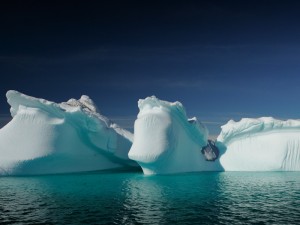 In June, Shell kicked off its controversial Arctic program to conduct exploratory operations in the Chukchi Sea and the Arctic Ocean. Shell plans to drill two wells beginning in August 2015, when ice clears. Shell initially purchased leases to drill in the Arctic in February 2008 from the Bush Administration’s Interior Department, leases that have been repeatedly endorsed by the Obama Administration, most recently in March 2015. The success or failure of these operations could significantly affect future efforts to explore for hydrocarbons in the region.
In June, Shell kicked off its controversial Arctic program to conduct exploratory operations in the Chukchi Sea and the Arctic Ocean. Shell plans to drill two wells beginning in August 2015, when ice clears. Shell initially purchased leases to drill in the Arctic in February 2008 from the Bush Administration’s Interior Department, leases that have been repeatedly endorsed by the Obama Administration, most recently in March 2015. The success or failure of these operations could significantly affect future efforts to explore for hydrocarbons in the region.
Shell previously abandoned its Arctic exploration program in the 1990s due to high comparative costs (its Gulf of Mexico leases, amongst others, were more cost-effective); but it has now determined that the global demand for oil justifies its decision to return to the region. As reported in the New York Times, industry experts and national security officials view Alaska’s Arctic as the “last great domestic oil prospect, one that over time could bring the country a giant step closer to cutting its dependence on foreign oil.” Former Senator Mark Begich (AK-D) has also stated that “development in the Arctic has already been subjected to unprecedented safety standards – far more than domestic production anywhere else.”
Opponents of Arctic exploration cite concerns over the risk of a serious oil spill, despite the technologies developed since the Macondo spill. Opponents such as NRDC contend that the U.S. is still not equipped to respond to a spill. The remote region has limited infrastructure, poor satellite coverage and the U.S possesses a small number of icebreakers, all of which could jeopardize spill response efforts. A group of U.S. Senators also strongly opposes Arctic drilling because it threatens the habitat for marine mammals, especially walrus, which are protected under the Marine Mammal Protection Act. Additionally, some have expressed concerns that Arctic development could prevent the U.S. from reaching its goal of an 80% reduction in carbon emissions by 2050.
While it is correct that the standards for safety and environment are tougher than anywhere in the US, it is also correct that Shell (and others) are actually not able… Read more »
Let’s begin with a reality that ought to end this conversation. Neither Shell nor any other oil company currently or prospectively has the technological capability to clean up a major… Read more »
In addition to the issues raised above, there is another reason why Shell should not continue with its Arctic exploration. Scientists tell us that we need to leave 80% of… Read more »
I think we need to consider Mr. Grant’s third question “Should the U.S. government invest in additional Arctic oil spill response capabilities?” separately from the issue of Shell’s drilling in… Read more »
Why not experimental drilling restricted to natural gas? As is generally accepted, as a bridge fuel to greater negatropy and renewables, natural gas has a number of environmental benefits. In… Read more »